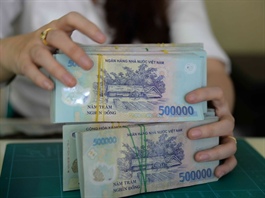Budgetary spending reviews to ensure radical thrift
Budgetary spending reviews to ensure radical thrift
Feeling insecure about the national financial situation, the National Assembly and the government have continued highlighting strict management of the state budget this year, when there will be a higher-than-expected budget deficit caused by a rise in spending due to the pandemic and a reduction in revenue from businesses.

Budgetary spending reviews to ensure radical thrift - illustration photo (shutterstock)
|
The government and the National Assembly (NA) last week asked ministries, agencies, and localities to offer plans on reviewing state funding in order to mobilise funds for economic recovery and development.
“Money for organising conferences and business trips must be saved radically. No money can be spared for unnecessary activities,” stated Prime Minister Nguyen Xuan Phuc. “It is necessary to further strengthen financial and state budgetary discipline, with radical thrift in recurrent spending.”
The government last week officially reported to the NA that in 2020, the ongoing COVID-19 pandemic has been causing a decline in businesses’ performance and in state budget revenue because of the application of policies on supporting healthcare, production, and social security. This will lead to a rise in state budget deficit, at about 5 per cent of GDP, which is calculated to be about VND6.3 quadrillion ($273.9 billion).
It is calculated that the total state budget deficit this year will be VND363 trillion ($15.78 billion), far higher than the target of VND234.8 trillion ($10.2 billion) and last year’s VND203 trillion ($8.82 billion).
Total state revenue this year will likely be VND1.323 quadrillion ($57.5 billion), down 14.7 per cent on-year. Total state spending is forecast to be VND1.69 quadrillion ($73.3 billion), down 3.54 per cent on-year.
State-run PetroVietnam reported that in the first eight months, its total revenue is estimated to be VND332.64 trillion ($14.46 billion), down 25 per cent on-year. The figure was down 33 per cent on-year.
The group’s total export turnover in the period is estimated to be $1.27 billion, down 42 per cent compared to the same period last year, with crude oil exports being over 6.56 million tonnes, down 12 per cent on-year, and exports of liquefied petroleum gas hit just over 143,000 tonnes, a 47 per cent on-year slump.
Meanwhile, state-run Electricity of Vietnam earned in the first eight months of the year an estimated sales revenue of over VND257.56 trillion ($11.2 billion), up only 1.7 per cent on-year, far lower than that in the same period last year.
Meanwhile, since early this year, the government has spent over $700 million on activities to fight COVID-19, including more than $180 million for pandemic protection and prevention (testing, quarantine, medical devices, and equipment). Moreover, policies on defer tax payments and directly supporting enterprises and the public have also mounted to tens of billions of US dollars.
According to the World Bank, the negative fiscal impact associated with the COVID-19 crisis should increase in the next few months in Vietnam. The decline in tax collection was generalised to almost all taxes and accelerated in the second quarter, when the government collected only 76 per cent of the amount recorded during the same period a year ago. Such a decline was explained by the slowdown in economic activity and the implementation of tax deferral measures that are expected to continue to the end of the year.
“In its effort to alleviate the financial burden on the private sector, the government has further reduced the corporate income tax for small- and medium-sized enterprises, which may cost the budget an additional $1 billion in the remainder of 2020,” said a recent report on Vietnam’s economy by the World Bank.
Vu Hong Thanh, Chairman of the NA’s Economic Committee, told the NA that one of the most important factors in the effective management and use of the state budget is to “strongly pare down recurrent spending of state agencies.”
According to the General Statistics Office, recurrent spending often occupies nearly 70 per cent of total budget spending. Last year it was VND928 trillion ($40.35 billion), or 71.4 per cent of total state budget spending of VND1.3 quadrillion ($56.5 billion).
In the first nine months of 2020, while the total budget expenditure was over VND1 quadrillion ($43.47 billion), the recurrent spending hit VND716.3 trillion ($31.14 billion) or 71.6 per cent.
In order to spur on enterprises’ performance, accordingly fuelling state budget revenue, the Ministry of Planning and Investment has proposed that the government issues a new support package which is large and effective enough to continue to help enterprises out of difficulties.
Besides this, bigger administrative reforms must be boosted, in addition to the government’s expected support for businesses to import materials for production and seek output markets.



























